- Home
- Anne Stuart
Driven by Fire Page 8
Driven by Fire Read online
Page 8
But Ryder would have killed him. She had no doubt of that—Billy had had a gun and he’d never been one to back down from a dare. If she hadn’t lied they might all three be dead in a hail of bullets.
Instead they were alive, all three of them, with Matthew Ryder viewing her with the deep distrust she deserved. He was intense and tenacious—sooner or later he was going to find Billy’s connection to that freighter filled with women and children, and then, for all she knew, he might shoot her for lying to him.
If Billy stayed away long enough, stayed out of trouble, then he had a fighting chance. He was only twenty-two, for God’s sake. It had to be the first time he’d gotten involved in something so foul that not even her father would touch it. He must have learned his lesson. Please, God, let him have learned his lesson.
Her only contact with him had been that brief conversation when he’d begged her for his cell phone, and she’d felt like a cranky bitch for refusing him. If worse came to worst, if he slipped and got back into something as heinous as human trafficking, she could always use it as leverage to force him to quit, though whether he’d believe she’d actually turn him in was a moot point.
She hadn’t bothered talking to the rest of her family. Her father wouldn’t want to know what she’d done, and she refused to give him the satisfaction of knowing she’d helped a criminal, albeit an unwitting one, escape. It was none of their business, only hers.
She was paying for her own crimes already. She believed in karma, not in hell, and payback was a bitch. Her house. Gone, everything was gone—the pictures of her mother, her books, the few pieces of jewelry her mother had left her. The Limoges dinner set, the Tiffany pitcher . . .
She had to stop thinking about it, or it would make her crazy. She remembered more—being shaken awake time after time, only to grumble and fall back asleep again. It must have been Doc Gentry. That’s where she was—she remembered now. In Dr. Gentry’s shack by the water, but she had no idea what slow-moving river ran along the side of the place. It was too small for the Mississippi, and a bayou was more stagnant. Ryder must have gone back to the city and left her in Doc’s capable hands.
She snuggled down further. Now that her eyes were accustomed to the darkness, she could make out a faint sliver of light behind the door and the muted sound of music from a computer or a CD player. Hell, in this place it might even be a record player. Dr. Gentry was pretty old school. Jenny recognized the music—it would be no other but the great Satchmo himself. The song was “Basin Street Blues,” but she would know the tone and the sound of his trumpet anywhere. The slow, sad notes drew her, and she climbed out of bed, the old dressing gown rumpled around her, and headed toward the music.
It was coming from the back porch overlooking the river. There was a moon that night, shining down on the river, and she moved toward it without thinking, drawn to the music as it slowly picked up tempo.
At first she thought no one was out there. The chairs were empty, and the hammock that was strung along one side didn’t move. She walked to the railing, looking out over the shining stillness of the slow-moving river as a fish leapt in the water, all grace and silver beauty, before it splashed back down again and was gone.
She sank into one of the chairs and put her feet up on the railing. The flimsy dress slipped past her knees, and there was a faint breeze off the water, cooling her. Where had Ryder gone? It shouldn’t matter—she was safe now. The car was gone, he was someplace else, and for the time being no one was going to bother her. She was going to sit by the river, the soft music in the background, and try to figure out what she was going to do with her life without the distraction of Ryder.
“Couldn’t sleep anymore?” Came his deep voice from the doorway, and Jenny’s heart caught.
Ryder took a long, unemotional look at the woman who just might be an international terrorist and wondered if he was being way too suspicious. She looked rumpled, sleepy, and Doc had put her in some kind of nightgown or dress that gave him way too good a view of her body. Knowing Doc, she probably did it on purpose just to teach him a lesson.
“You think that little girl is a killer, Matthew?” she’d demanded over glasses of her excellent bourbon once Jenny had fallen asleep. “You’ve lost your touch. She’s as innocent as a stray lamb.”
“And I’m the big bad wolf?” he’d countered. “I don’t think so. She’s hiding something, I know it, and I don’t give up until I know the answers.”
Now, a few hours later, Jenny jumped at the sound of his voice, and she reached for the filmy shawl on the back of the chair, one that did very little for her modesty. Maybe she didn’t realize how the moon illuminated every curve and shadow. Clearly she thought she’d been alone. That, or she thought he was stupid enough to be distracted by a half-naked woman. Not a chance.
“I thought you were gone!” she said in the edgy voice he’d gotten used to. “What happened to the car?”
Why was she so damned twitchy around him? Not that he went out of his way to be agreeable, but if she was who she said she was, then she was in no danger from him. “I got rid of it,” he said, watching her. “Had someone take it north to Baton Rouge and leave it there. We don’t want it leading anyone to us.”
“Us?” she echoed.
“Afraid you’ve got me as your constant companion, at least until we find out who’s so interested in trying to kill you. Consider me your new BFF.”
“No one’s trying to kill me,” she said flatly. “It’s impossible. I have no enemies, and not enough of a connection to my family to be a target of something like that. You must have made a mistake about the explosive device.”
“Bomb,” he corrected. “And I don’t make mistakes—if I hadn’t recognized it I wouldn’t have gotten you out of there in time and the question would be irrelevant. No one gets shot and has their house blown up in the space of a few short hours without having some very bad people after her. What I want to know is, what have you done to make such a determined enemy?”
“Nothing! That’s why it’s so impossible—no one has any reason to hurt me. Maybe they’ve mistaken me for someone else.”
“Maybe.”
“I have other people who can protect me, you know.” She pulled the shawl tighter around her and shivered despite the warm night air blowing off the river. “It’s not your responsibility.”
He shrugged. “I’ll just drop you off at the family compound and you can leave it up to your brothers and your father’s enforcers to keep you safe. And that might even work. For a while.” He paused, waiting for the words to sink in. He suspected his self-sacrificing heroine would walk barefoot on Mardi Gras before she would go back home to her family, but he wasn’t that much better an option in her eyes.
He continued in the face of her silence. “Of course, they don’t have the connections or intel to find out who’s trying to kill you, not unless it’s one of their many enemies and they’re targeting you as a hapless symbol of the Gauthier family. In which case going home is a very bad idea as well.”
“Why?” She sounded perfectly controlled.
“Because attacking you would simply be the opening shot in an all-out war, and your father’s house on Royal Street would be the obvious target, not our headquarters.”
She turned to face him, putting the delicious bits of her body in shadow. What the fuck was he doing, lusting after Jenny Parker, Esquire? She was a major pain in his ass. Because lusting he was, and everyone knew it but her. It was a good reason for his cantankerous mood—you didn’t fuck people of interest.
Maybe it’d been too long since he’d been gotten laid. He’d been too busy setting up the American Committee to bother, and his partner had been having enough sex for both of them. Not that Bishop ever slacked off on the job—he was a great multitasker, and Ryder actually liked his wife, Evangeline. He just needed things to settle down into some kind of normalcy, and that didn’t include falling into the sack with a woman who could be as treacherous as a snake.
> But Parker, oblivious to the convoluted direction his thoughts were taking, simply stood there. “What makes you think the house on Royal Street is his only residence? There are at least three other places that no one knows about . . .”
“The house in the Quarter, one in Lafayette, and the apartment in Atlanta,” he rattled off, much to her obvious annoyance, “and I’m sure he could buy any number of bolt-holes for you, if you decided to ask him. I thought you made it a habit not to accept anything from your crooked family.”
“That’s easy enough to say when no one’s trying to kill you,” she muttered.
She looked like an unhappy little girl with her rumpled hair and troubled expression, at least, when he wasn’t looking any lower than her face. It was almost comical, but Ryder wasn’t amused. “You don’t need to break your holy vow, Parker. No matter how much protection your father offers, it won’t be enough.”
“Why? I’m not worth anything to anyone. I’m not an international terrorist or a trafficker or even a very good lawyer. Scratch that—I’m a damned good lawyer, but not good enough that anyone would want to kill me. It doesn’t make sense.”
He could almost believe her. She really did seem confused, but there was still the faint trace of guilt to her. She was hiding something from him, and until he found out what it was, she was the enemy. “You’re old enough to know life doesn’t make sense.” His voice was caustic.
“I suppose you’ve got an impregnable place somewhere that’s just the thing to keep me safe?”
“The house in the Garden District. You’ll stay there until we find out what’s going on.” He wasn’t giving her a choice in the matter. “Whether you believe it or not, that place is impregnable.”
“Unless I try to step out the front door.”
“My point exactly.”
He could see her frustration. “I believe you,” she said finally. “I brought Soledad there, didn’t I?”
“Speaking of whom, she’s been wandering around the place when she was told to stay put. Remy isn’t having any of it, and he can be an absolute bastard when he wants to be, and they’ve all had to be on high alert since they heard what happened to your home. We need you to keep her under control.”
“Home?” she echoed dully, and he could see she was thinking about the bomb. Who the hell could have set it, and why? What was Ms. Parker mired in so deep that people were determined to take her out? He tended to be on the sides of the victims, but with Jenny Parker he wasn’t sure which she was, an innocent or the devious target of a rival group of criminals. If she’d been involved in the trafficking, surely he would have come up with a trace of evidence by now—he’d been looking hard enough. All he had was circumstantial—her appearance just as they were raiding the ship, her speed in settling the victims so they couldn’t answer questions. He hated liars, and Jenny Parker was lying to him.
“Don’t think about it.” There was no sympathy in his crisp voice. “Denial is more than a river in Egypt, and it can come in handy on occasion.”
“You just don’t want a crying female all over the place,” Jenny said, sounding morose enough to be believable. Almost.
“You’re right. I’m going to find out who’s behind the attacks. I’m going to find out everything. And your cooperation would help.”
“Like what?”
“Like telling me what you were really doing on the ship that day, and why that phone is totally different from the one I found when I searched your purse.”
“You did what?” she said, outraged.
“Don’t get your knickers in a twist. The purse and the cell phone are gone anyway. They blew up with your house.”
“Nice of you to remind me.”
“So why the different phone?”
It might have been a trick of the moonlight, but she looked a little sick. “I upgraded mine—is that a crime?”
“No. I just wouldn’t have pegged you as such a devoted football fan.”
She looked confused. Score one for him. “What do you mean?”
“The New Orleans Saints case on the old phone.”
She let out a sigh. “Everyone who lives in New Orleans loves the Saints,” she said. “So what? Exactly what are you accusing me of?”
“Not a damned thing. Not yet.” She wouldn’t be fooled by his almost affable tone. Ms. Parker was no fool.
“I’m worried about Soledad,” she said, changing the subject.
“We’ll head back when it gets light—even hired killers need to sleep, and it’s the safest time.”
“Since you’ve gotten rid of our stolen car, how do you intend to get us there?”
She wasn’t arguing about coming back, he thought. He was expecting her to put up more of a fight. Again, suspicious behavior that had no explanation.
“Wilson will bring a car out to get us.” He took a step closer, and she backed up, almost imperceptibly. He caught her arm. “Watch it! That railing is weak, and you don’t need to go feed yourself to the gators to get away from me. Have I ever made a single pass at you?” Which had been easier when she wasn’t wearing that filmy dress.
“No,” she said warily. “You don’t even like me.”
He didn’t bother to correct her. She was too close. He could smell Doc Gentry’s herbal soap on her warm skin, feel the rapid increase in her pulse. She wasn’t immune to him either, unless he simply frightened her. He was trying to, but it was more than that.
He could pull her closer to him, wrap his arm around that warm body with the mysterious curves and shadows, tilt her face up to his, and kiss her. He could strip that gown off her and take her against the rickety railing; he could get the truth out of her one way or another and he really wanted it to be this way.
In his experience women knew when a man wanted them, even if it was only subconscious, but he had no intention of giving her any proof.
“Sit down before you fall down,” he said, releasing her arm, and she dropped back into the nearest rocker. “Stay put.”
He turned back into the house to grab a blanket and another glass of whiskey. He draped the blanket around her, and she jumped, startled by his sudden presence. “Take this.” He handed her the glass of dark bourbon.
She tried to push it back. “I don’t like whiskey.”
“Every good Southern girl drinks whiskey, especially those from New Orleans.”
“Well, I’m about as much a good Southern girl as you are a Southern gentleman,” she said.
“Well, amen to that,” he drawled. “Drink the damned whiskey.”
“My head . . .”
“Your head is fine. Doc Gentry said it was, but I’ve been waking you up every hour just to check on you. Drink the damned bourbon.” She took a ladylike sip, and her tense shoulders relaxed slightly. He went in for the kill. “So who do you think is trying to kill you?” He dropped down in the seat beside her and put his bare feet on the railing in front.
She glared at him. “How many times do I have to tell you? No one would have any reason to kill me.”
He hid his frustration at her obstinacy. “I’ve found that in this life there is always at least one person ready to kill you, no matter how blameless a life you lead. And you, lady, cannot be as innocent as you seem.”
She stared at him for a long, thoughtful moment, so long he was starting to feel uncomfortable. “That is the saddest thing I’ve ever heard,” she said finally.
“No, it isn’t. If I’m to believe you, Soledad has led a life that’s the stuff of telenovelas.”
“Telenovelas aren’t as brutal as Soledad’s life. And don’t distract me.” She took another sip of her whiskey, and he realized she really wasn’t used to drinking. She’d already dropped some of her usual defenses. “What kind of life have you lived that’s made you so cynical? No, you’re beyond cynical, you’re nihilistic.”
“What?”
“Nihilistic. It means that nothing matters to you . . .”
“I know what nihilistic means,”
he said irritably. “And I’m not. I’m just realistic.”
For a moment she looked confused, and she took another sip. She was getting tipsy, and he had every intention of taking advantage of it. If, in fact, it wasn’t just an act she was putting on. Everything about her could be an act, given the simple fact that she was hiding something.
“Tell me what you think you know about me, Ms. Parker. No, even better, I’ll tell you what you think you know about me. I was a troubled kid from a broken home. My father beat me, my mother died young, and I got mixed up with street gangs early. I must’ve come from some inner city like DC—yes, we’ll call it DC—and when I got caught stealing cars the judge gave me the choice of jail or the army. I chose the army, it made a man out of me, and I was recruited for the Committee from there. Does that sound about right? Poor, tragic street kid who found redemption in the killing of bad guys?”
She was staring at him in fascination. “How awful!” she said in a voice so concerned he almost felt guilty. Almost.
“Yup, it’s a sad, sad story. The plot of many a bad TV show—it just doesn’t happen to be true.”
The softness left her eyes, and there was a flash of anger in them, something he was much more ready to believe. “You bastard,” she said.
“Nope, not that either.” He was enjoying himself. There was nothing he enjoyed more than pissing off Ms. Jenny Parker, Esquire. It kept her at arm’s length.
“Then what is the truth?”
“None of your damn business.” Growing up in Idaho with a single mother was far too dull, and he didn’t want any of her damned bleeding-heart sympathy.
In response she threw the dregs of her whiskey glass at him, and he blinked in shock. She’d already finished most of it, so the effect was no more than if she’d spit in his eye, but she froze in horror, while he took the hem of his T-shirt and calmly wiped the whiskey off his face.
“I’m so sorry,” she gasped. “I don’t know what made me do that.” She had leapt from a chair, staring at him like he was the lethal SOB he truly was, which just went to prove she had the good sense to recognize a threat when she saw one.

 Ice Blue
Ice Blue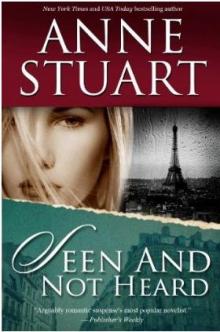 Seen and Not Heard
Seen and Not Heard Never Marry a Viscount
Never Marry a Viscount Heartless
Heartless The Devil's Waltz
The Devil's Waltz Hidden Honor
Hidden Honor Silver Falls
Silver Falls Fire and Ice
Fire and Ice Nightfall
Nightfall Never Trust a Pirate
Never Trust a Pirate The Soldier and the Baby
The Soldier and the Baby Still Lake
Still Lake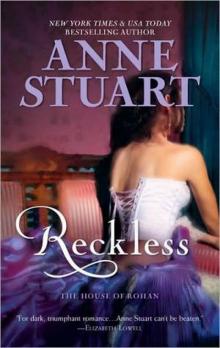 Reckless
Reckless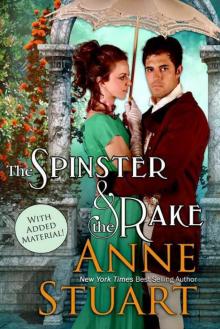 The Spinster and the Rake
The Spinster and the Rake Winter's Edge
Winter's Edge At the Edge of the Sun
At the Edge of the Sun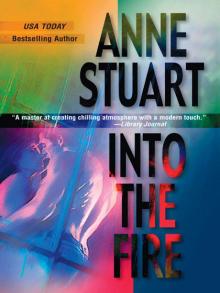 Into the Fire
Into the Fire Night of the Phantom
Night of the Phantom Ritual Sins
Ritual Sins Darkness Before the Dawn
Darkness Before the Dawn Against the Wind
Against the Wind Ruthless
Ruthless The Catspaw Collection
The Catspaw Collection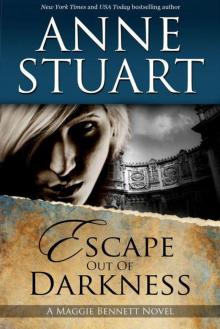 Escape Out of Darkness
Escape Out of Darkness The Widow
The Widow Shameless
Shameless Black Ice
Black Ice Breathless
Breathless Shadows at Sunset
Shadows at Sunset Falling Angel
Falling Angel Housebound
Housebound Cold as Ice
Cold as Ice The Wicked House of Rohan
The Wicked House of Rohan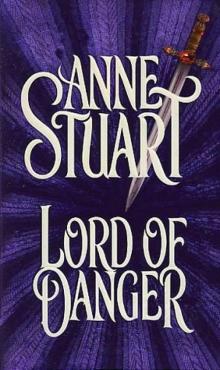 Lord of Danger
Lord of Danger The High Sheriff of Huntingdon
The High Sheriff of Huntingdon Wildfire
Wildfire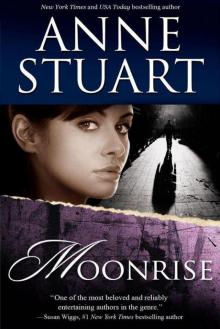 Moonrise
Moonrise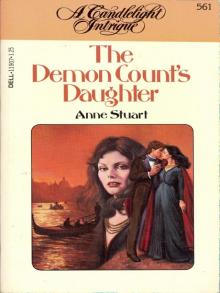 The Demon Count's Daughter
The Demon Count's Daughter Date With a Devil
Date With a Devil To Love a Dark Lord
To Love a Dark Lord Driven by Fire
Driven by Fire Special Gifts
Special Gifts Ice Storm
Ice Storm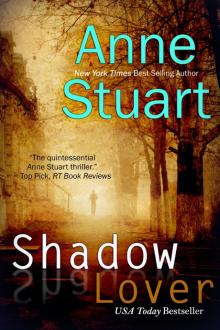 Shadow Lover
Shadow Lover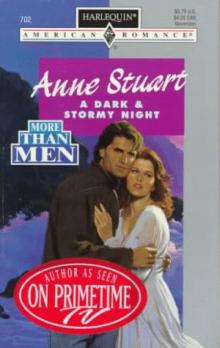 A Dark & Stormy Night
A Dark & Stormy Night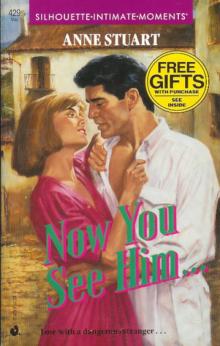 Now You See Him...
Now You See Him... Lady Fortune
Lady Fortune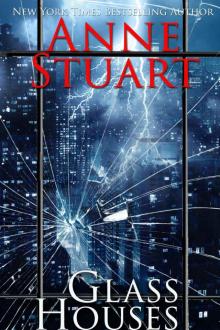 Glass Houses
Glass Houses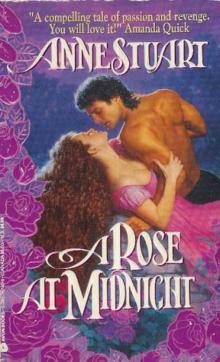 A Rose at Midnight
A Rose at Midnight Prince of Swords
Prince of Swords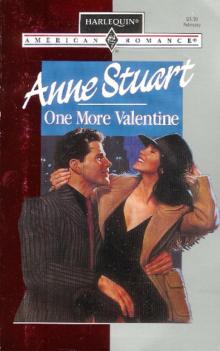 One More Valentine
One More Valentine Return to Christmas
Return to Christmas Tangled Lies
Tangled Lies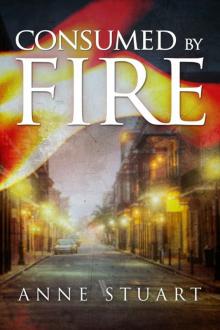 Consumed by Fire
Consumed by Fire The Fall of Maggie Brown
The Fall of Maggie Brown Wild Thing
Wild Thing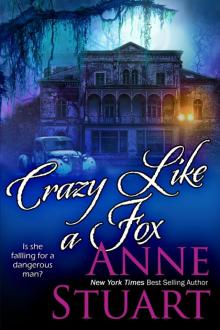 Crazy Like a Fox
Crazy Like a Fox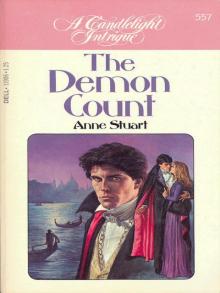 The Demon Count
The Demon Count Prince of Magic
Prince of Magic Wildfire (The Fire Series Book 3)
Wildfire (The Fire Series Book 3)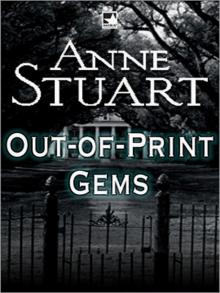 Anne Stuart's Out-of-Print Gems
Anne Stuart's Out-of-Print Gems Shadow Dance
Shadow Dance Under an Enchantment: A Novella
Under an Enchantment: A Novella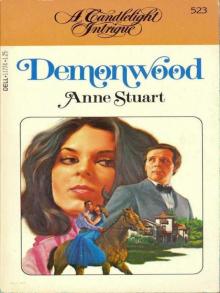 Demonwood
Demonwood Blue Sage (Anne Stuart's Greatest Hits Book 3)
Blue Sage (Anne Stuart's Greatest Hits Book 3)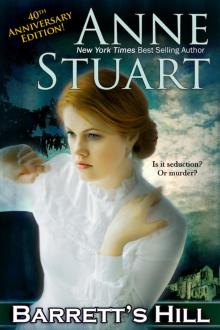 Barrett's Hill
Barrett's Hill Angel's Wings (Anne Stuart's Bad Boys Book 5)
Angel's Wings (Anne Stuart's Bad Boys Book 5) Darkness Before Dawn
Darkness Before Dawn The Right Man
The Right Man The Houseparty
The Houseparty Reckless_Mills & Boon Historical
Reckless_Mills & Boon Historical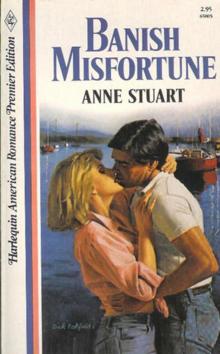 Banish Misfortune
Banish Misfortune Angel's Wings
Angel's Wings Chain of Love
Chain of Love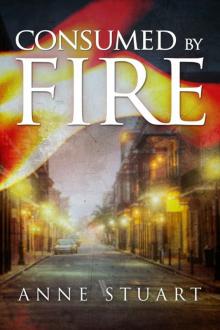 Consumed by Fire (The Fire Series)
Consumed by Fire (The Fire Series)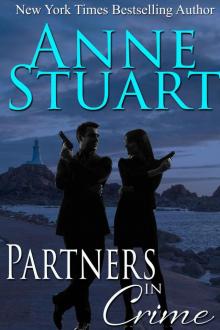 Partners in Crime (Anne Stuart's Bad Boys Book 4)
Partners in Crime (Anne Stuart's Bad Boys Book 4) The Soldier, The Nun and The Baby (Anne Stuart's Greatest Hits Book 2)
The Soldier, The Nun and The Baby (Anne Stuart's Greatest Hits Book 2)